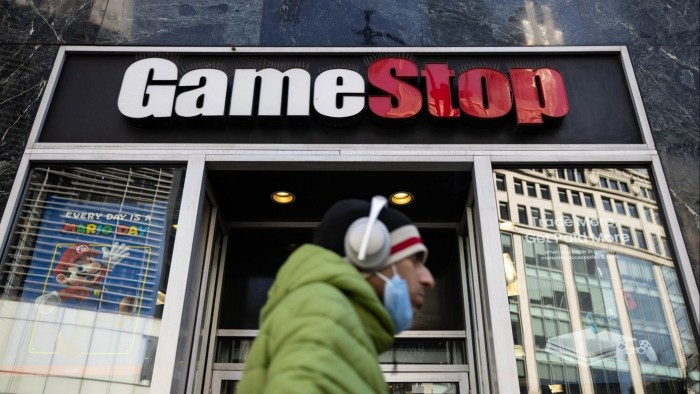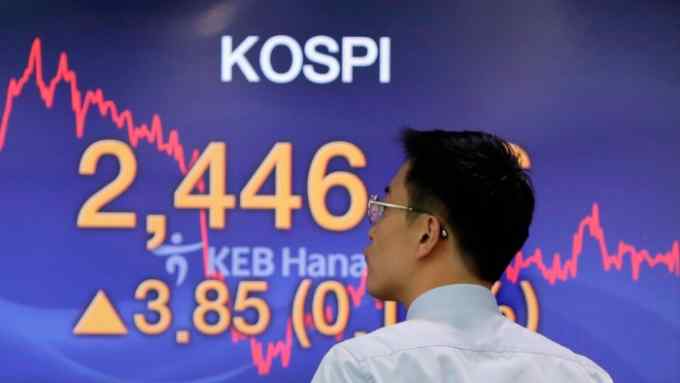European investors count the cost of US ‘meme stock’ clean-up

Roula Khalaf, Editor of the FT, selects her favourite stories in this weekly newsletter.
European fund managers and banks face a rush to be ready for reforms to the US securities market in the wake of the meme stocks mania, or potentially face problems trading in the world’s biggest capital market.
A rush of activity has been sparked by a US plan to halve the two-day window set aside to finalise millions of share and bond deals, starting next May. The move marks one of the biggest changes to the US market structure in recent years, with ramifications for traders around the world.
European institutions held more than $11tn of US equities and debt last year, according to the Federal Reserve. But their ability to trade them will be shaken by the implications of the project, known in the industry as a move to T+1.
Interlinking markets, such as foreign exchange and cross-border ETFs are likely to be thrown out of synchronisation. Institutions have relied on having at least one full working day to iron out operational issues, from finding the money or the assets, resolving mismatches or overcoming local IT issues.
From late May, that timeframe will drop to as little as a few hours before trades that were lined up are cancelled, as the US moves from two-day to one-day settlement.
“If for whatever reason we’ve got the wrong settlement instructions, we’ve only got a few hours to try and sort that out,” said Gareth Bateman, trade execution manager at asset manager Montanaro.
In the wake of the meme stock episode, US regulators have homed in on the settlement, a little-noticed but critical market service in which buyers and sellers reconcile their deals and legally transfer assets. Brokers struggled to cope with the volume of trades, and were asked to stump up collateral by the clearing houses that sit between buyers and sellers and settle trades.
Critics argued the two-day window increased that strain by saddling the system with 48 hours’ worth of unsettled trades. The settlement bottleneck stopped investors from buying some popular stocks such as GameStop and AMC.
Shortening the settlement period will reduce the funds — known as margin payments — brokers need to post at a clearing house to cover potential losses while the trade is being settled.
“The move to T+1 is going to impact all US securities and all baskets that contain US securities,” said Jim Goldie, head of ETF capital markets for Europe, Middle East and Africa at Invesco. “The bulk of the pain is really the misalignment between one region and another,” he added.
Such is the heft of US markets that Canada and Mexico subsequently announced plans to reduce their settlement windows to a single day, and all three countries will go live on the same weekend at the end of May next year.
Last week the European Securities and Markets Authority asked the industry for input on the costs and benefits of moving its market to T+1, to see if it would enhance the attractiveness of the bloc’s capital markets.
But that will be of little benefit for settlement teams in Europe. From next year, they will have only a few hours between the end of the US trading window at 4pm Eastern Standard time, and the end of the settlement window at 9pm — the early hours of the next day in Europe.
The US shortened its settlement window from three to two days in 2017, but next year’s move marks a more dramatic reduction. AFME, a European trade body for banks and brokers, estimates the move will mean an 83 per cent reduction in settlement times for local banks and investors.
Moreover, the shift will throw US securities settlement out of lockstep with related global markets, including the vast $2tn a day spot foreign exchange market. Global currency trades currently settle within two days, meaning that non-US traders trying to buy American assets will need to source dollars in advance to pay for the goods, or have to scramble to find the cash in time.
CLS, the world’s largest foreign currency settlement system, is exploring pushing back the close of its own daily settlement window, to accommodate currency deals that fund securities transactions.
“That’s being discussed and under consideration by CLS,” said Peter Tomlinson, director of post trade at AFME, but he added that current currency settlement windows are also “based around central bank funding windows and cut-off times and so any changes made there, there’s potentially knock on impacts”.
Another impact is in the ETF market, for funds that contain both US and non-US assets.
“They’re transferring the risk to operational and back and middle office type risk, because there will be new stress points in the system like matching trades and FX settlement,” said David Stevenson, deputy head of dealing at Aegon Asset Management.
Some European asset managers are shifting staff to the US to help with the workload, such as Scotland-based Bailie Gifford, which is moving three employees. However, for many smaller firms, the cost of relocating or hiring staff in the US is too great.
International investors are speeding up and automating their processes, in a bid to prevent staff having to work late into the night. “A lot of it’s to do with problems and processes that aren’t fully automated, issues that somebody needs to resolve,” said Virginie O’Shea, founder of advisory firm Firebrand Research.
Montanaro’s Bateman said the London-based fund manager was also trying to automate as many processes as possible.
“We’re trying to avoid having any human involvement at that time of day,” he said.

Comments